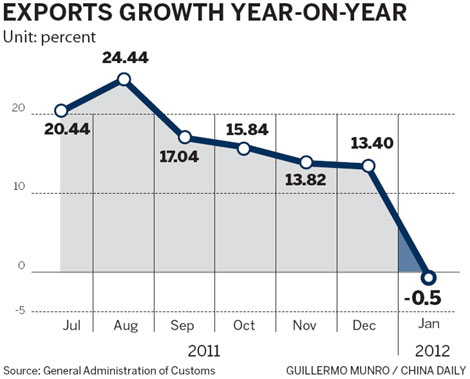January exports decline slightly
Updated: 2012-02-11 07:56
By Ding Qingfen and Wang Ying (China Daily)
|
|||||||||
February will see a rebound, but second half may be problematic
BEIJING/SHANGHAI - China's exports in January registered a decline from a year ago - the first monthly fall in more than two years - as demand from the debt-stricken European markets continued to shrink and the week-long Chinese New Year holiday hurt global purchases.
Economists said the decline is an isolated case and the country's exports will rebound in February.
Exports declined by 0.5 percent year-on-year to $149.9 billion last month, and imports dropped by 15.3 percent to $122.7 billion, leading to a trade surplus of $27.2 billion, according to statistics from the General Administration of Customs on Friday.

The administration explained that fewer working days in January resulted in the export decline. "Disregarding the seasonal factors, China's exports posted double-digit growth," it said.
Experts differ on the reasons for the decline. "Obviously, the fall should be attributed to seasonal distortions and the week-long holiday," said Wang Tao, chief economist with UBS AG in China.
However, Li Wei, an economist from Standard Chartered Bank PLC in Shanghai, held a different view. "It's hard to tell if it is a reflection of the slackening global demand or the result of seasonal distortions."
In January, China's exports to the European Union, the largest destination for Chinese-made goods, fell by 3.2 percent year-on-year, mainly dragged down by a drop of 28.2 percent in shipments to Italy.
Exports to Hong Kong fell by 16.4 percent year-on-year, while those to Taiwan decreased by 28.2 percent.
Sagging demand
Many small and medium-sized enterprises, especially those in light industry, said they are suffering from sagging demand in the United States and the European markets. In addition, the lower-cost Southeast Asian markets are taking orders away from Chinese companies.
"It's getting harder to obtain orders and the profit margins are narrowing while cost pressures are mounting," said Ni Bayi, chairman of a shoe-material company in Wenzhou in Zhejiang province.
"Everything is getting higher in price ... raw materials, labor and land. The appreciation of the renminbi is also adding to our difficulties," Ni said.
Since late last year, Chinese exporters have been complaining about the worsening business environment both at home and abroad, represented by shrinking global demand, especially in the developed markets, a rising yuan, and higher labor costs.
On Wednesday, the State Council, China's cabinet, said in its new guidelines on promoting employment that China's minimum wage will register annual growth of more than 13 percent from 2011 to 2015.
The yuan advanced to an 18-year high on Friday, standing at 6.2937 against the greenback.
Premier Wen Jiabao said last week that China will try to maintain basically "stable" foreign trade policies, adding that any adjustments should be more "encouraging than restrictive".
"Exports will rebound in February, turning to growth, as the world economy is not as bad as we had expected," said Wang.
Economists said the economic recovery in the US is gaining ground, after figures were released that showed the country added 243,000 jobs in January.
According to the Chinese customs, the country's exports to the US surged by 5.4 percent year-on-year in January. Meanwhile, exports to Japan rose by 6.1 percent, while those to South Korea increased by 9.2 percent.
However, experts were not optimistic in the longer term as they believed increasing European debt woes will drag on demand.
"One thing is for sure, China's exports will decelerate after the second quarter," Li said.
In January, China's imports fell for the first time since October 2009, fueling concerns over whether domestic demand can sustain and support the global economy.
Related Stories
China's trade surplus to narrow to $150b 2011-12-15 13:26
China's 11 foreign trade to grow by 20% 2012-01-05 14:56
Weak export demand hits trade surplus in 2011 2012-01-06 07:12
MOC: Exports still driving growth 2012-02-08 08:57
- Decrease in lending deepens concerns
- China to expand government procurement
- Yuan hits new high ahead of Xi's visit
- January exports decline slightly
- Manufacturing hubs see slower profit growth
- New Year inflation jumps higher than estimated
- Chery exports up 21% in Jan
- Yuan rises to new high against the US dollar








